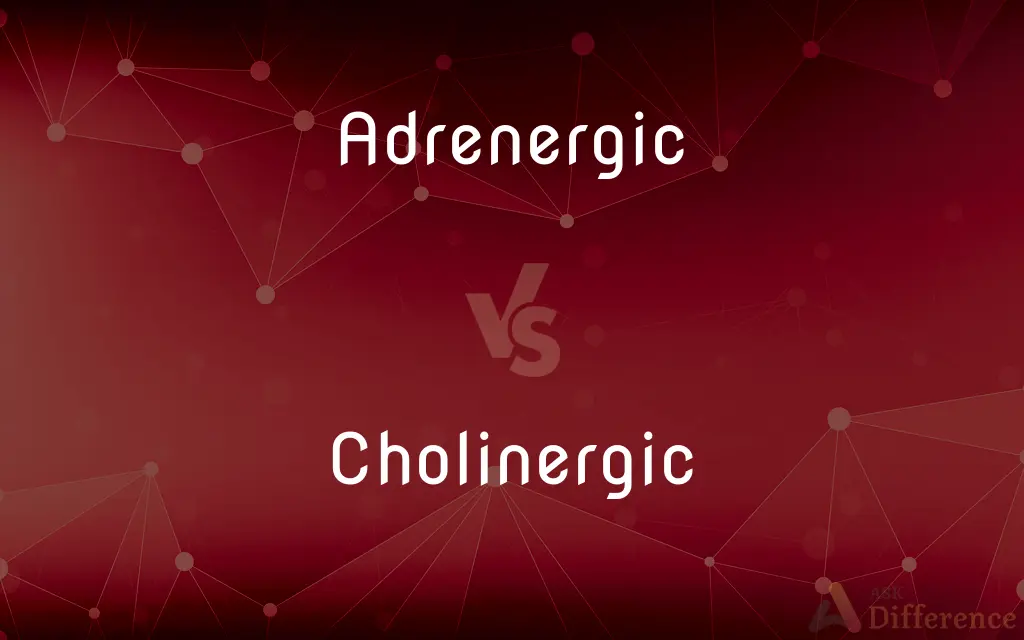Adrenergic vs. Cholinergic — What's the Difference?
By Tayyaba Rehman — Updated on September 26, 2023
Adrenergic pertains to nerve cells releasing adrenaline or noradrenaline, affecting the sympathetic nervous system, while cholinergic relates to cells releasing acetylcholine, impacting the parasympathetic nervous system.

Difference Between Adrenergic and Cholinergic
Table of Contents
ADVERTISEMENT
Key Differences
Adrenergic and Cholinergic refer to different neurochemical systems within the body, particularly in the context of the autonomic nervous system. Adrenergic neurons release adrenaline (epinephrine) or noradrenaline (norepinephrine) as neurotransmitters, primarily influencing the sympathetic nervous system, which governs the body's 'fight or flight' response. Cholinergic neurons, in contrast, release acetylcholine and predominantly influence the parasympathetic nervous system, responsible for 'rest and digest' functions, promoting relaxation and conservation of energy.
The physiological effects of adrenergic and cholinergic systems are largely contrasting. Adrenergic stimulation typically results in increased heart rate, dilated pupils, and increased blood flow to muscles, preparing the body for rapid action. Cholinergic stimulation usually induces opposite effects such as decreased heart rate, constricted pupils, and increased salivation and digestive activity, maintaining body homeostasis and facilitating recovery and regeneration.
In pharmacology, adrenergic and cholinergic terms are also used to describe drugs that mimic the actions of their respective neurotransmitters. Adrenergic drugs are used for conditions like asthma and hypotension due to their bronchodilator and vasopressor effects. Cholinergic drugs are used for conditions like myasthenia gravis and glaucoma, enhancing neuromuscular transmission and decreasing intraocular pressure, respectively.
Understanding the roles of adrenergic and cholinergic systems is crucial in medicine and physiology for effective therapeutic interventions. While adrenergic pathways primarily modulate stress responses and immediate energy expenditure, cholinergic pathways are essential for recuperation and maintaining internal balance. Targeting these systems with specific agonists or antagonists enables the modulation of numerous physiological processes and the treatment of various conditions, ranging from cardiovascular diseases to neurological disorders.
Comparison Chart
Neurotransmitters
Releases adrenaline or noradrenaline
Releases acetylcholine
ADVERTISEMENT
Physiological Effects
Increases heart rate, dilates pupils, prepares the body for action
Decreases heart rate, constricts pupils, promotes relaxation and digestion
Associated System
Influences the sympathetic nervous system
Influences the parasympathetic nervous system
Pharmacological Usage
Used for conditions like asthma and hypotension due to bronchodilator and vasopressor effects
Used for conditions like myasthenia gravis and glaucoma due to enhanced neuromuscular transmission and decreased intraocular pressure
General Function
Modulates stress responses and immediate energy expenditure
Maintains internal balance and facilitates recovery and regeneration
Compare with Definitions
Adrenergic
Pertaining to the actions of adrenaline or drugs that mimic adrenaline.
Adrenergic medications can help relieve asthma symptoms by dilating the bronchi.
Cholinergic
Describes the state or condition in which acetylcholine serves as the primary neurotransmitter.
Cholinergic activity in the brain is critical for memory and learning processes.
Adrenergic
Related to the release of adrenaline or noradrenaline from nerve endings.
Adrenergic neurons activate the body’s 'fight or flight' response to stress.
Cholinergic
Of or relating to a substance or process affecting the parasympathetic nervous system.
Cholinergic pathways facilitate relaxation and digestive activity in the body.
Adrenergic
Associated with the sympathetic nervous system and physiological responses such as increased heart rate and blood pressure.
The adrenergic response to danger prepares the body for rapid action.
Cholinergic
Relating to or denoting nerve cells in which acetylcholine acts as a neurotransmitter.
Cholinergic neurons are essential for muscle contraction and other basic physiological functions.
Adrenergic
Refers to substances that stimulate adrenaline receptors and produce effects similar to adrenaline.
Some adrenergic substances can induce increased alertness and energy.
Cholinergic
Refers to cells and molecules involved in the synthesis, release, or reception of acetylcholine.
Cholinergic agents can help improve neuromuscular transmission in certain medical conditions.
Adrenergic
Adrenergic means "working on adrenaline (epinephrine) or noradrenaline (norepinephrine)" (or on their receptors). When not further qualified, it is usually used in the sense of enhancing or mimicking the effects of epinephrine and norepinephrine in the body.
Cholinergic
Denoting substances that mimic the action of acetylcholine, especially in transmitting nerve impulses.
Cholinergic drugs are instrumental in managing diseases like glaucoma.
Adrenergic
Activated by or capable of releasing epinephrine or a similar substance, especially in the sympathetic nervous system
Adrenergic receptors.
Cholinergic
Cholinergic agents are compounds which mimic the action of acetylcholine and/or butyrylcholine. In general, the word "choline" describes the various quaternary ammonium salts containing the N,N,N-trimethylethanolammonium cation.
Adrenergic
Having physiological effects similar to those of epinephrine
An adrenergic amine.
Cholinergic
Activated by or capable of liberating acetylcholine, especially in the parasympathetic nervous system.
Adrenergic
Having the quality of adrenaline or epinephrine.
Cholinergic
Having physiological effects similar to those of acetylcholine
A cholinergic agent or drug.
Adrenergic
Containing or releasing adrenaline.
Cholinergic
(biochemistry) Of, pertaining to, activated by, producing or having the same function as acetylcholine.
Adrenergic
Activated by an adrenal mechanism
Cholinergic
(biochemistry) Any drug or substance producing or having the same function as acetylcholine.
Adrenergic
Any adrenergic compound
Cholinergic
Releasing or activated by acetylcholine or a related compound
Adrenergic
Producing or activated by epinephrine or adrenaline
Adrenergic
Drug that has the effects of epinephrine
Adrenergic
Relating to epinephrine (its release or action)
Adrenergic
Descriptive of cells, receptors, or agents that produce or are activated by adrenaline or an equivalent compound.
The adrenergic receptors on the heart muscle play a crucial role in cardiovascular response to stress.
Common Curiosities
Are there medications that act on adrenergic receptors?
Yes, there are medications designed to either stimulate or block adrenergic receptors, impacting physiological responses like heart rate and bronchial dilation.
What does adrenergic mean in physiology?
In physiology, adrenergic refers to the release of adrenaline or noradrenaline from nerve endings, primarily affecting the sympathetic nervous system.
How do adrenergic and cholinergic systems contrast in their physiological effects?
Adrenergic stimulation increases heart rate and prepares the body for action, while cholinergic stimulation decreases heart rate and promotes relaxation and digestion.
What is the function of cholinergic neurons?
Cholinergic neurons release acetylcholine as a neurotransmitter, predominantly affecting the parasympathetic nervous system, facilitating relaxation and digestion.
How are cholinergic agents used therapeutically?
Cholinergic agents are used to treat conditions like myasthenia gravis and glaucoma by enhancing neuromuscular transmission and reducing intraocular pressure.
How does cholinergic activity affect learning and memory?
Cholinergic activity, specifically acetylcholine release in the brain, plays a crucial role in cognitive functions like learning and memory.
Can adrenergic and cholinergic terms refer to drugs as well?
Yes, adrenergic and cholinergic terms describe drugs that mimic the actions of adrenaline or acetylcholine, respectively.
Do adrenergic and cholinergic systems operate simultaneously?
While they have contrasting functions, adrenergic and cholinergic systems can operate simultaneously, maintaining a balance in autonomic nervous system activity.
How do cholinergic drugs affect the body?
Cholinergic drugs, by mimicking acetylcholine, affect bodily functions such as muscle contraction, heart rate, and salivation.
Can cholinergic stimulation relieve stress?
Cholinergic stimulation promotes relaxation and conserves energy, potentially aiding in stress relief by activating the 'rest and digest' response.
What role do adrenergic neurons play in the 'fight or flight' response?
Adrenergic neurons release adrenaline or noradrenaline, activating the sympathetic nervous system, and preparing the body for 'fight or flight' in stressful situations.
Are there side effects associated with cholinergic drugs?
Yes, cholinergic drugs can have side effects like muscle cramps, decreased heart rate, and increased salivation and sweating.
Can blocking adrenergic activity reduce anxiety?
Yes, blocking adrenergic activity with beta-blockers can help reduce symptoms of anxiety by decreasing the 'fight or flight' response.
How do adrenergic receptors affect blood pressure?
Adrenergic receptors, when stimulated, can increase heart rate and contractility, and constrict blood vessels, leading to increased blood pressure.
Is the adrenal gland involved in adrenergic activity?
Yes, the adrenal gland releases adrenaline into the bloodstream, amplifying adrenergic activity throughout the body.
Share Your Discovery

Previous Comparison
Ether vs. Aether
Next Comparison
Ethanol vs. PropanolAuthor Spotlight
Written by
Tayyaba RehmanTayyaba Rehman is a distinguished writer, currently serving as a primary contributor to askdifference.com. As a researcher in semantics and etymology, Tayyaba's passion for the complexity of languages and their distinctions has found a perfect home on the platform. Tayyaba delves into the intricacies of language, distinguishing between commonly confused words and phrases, thereby providing clarity for readers worldwide.














































